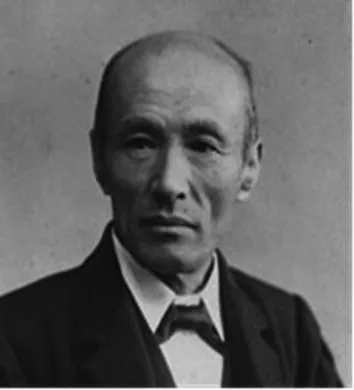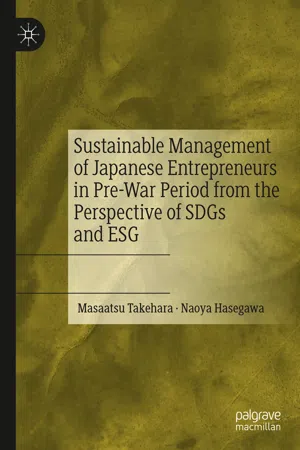1 Introduction
In Japan, two major pollution incidents occurred as a result of developing copper mines. These two incidents were called “Besshi in the west and Ashio in the east”. “Ashio in the east” refers to the Ashio copper mine, which Ichibee Furukawa started to manage from 1877. The Ashio Mining pollution incident became a serious social problem which shocked Japanese society in the Meiji period (1868–1912).
The Ashio Mining pollution incident occurred at the Ashio copper mine located near the Watarase-gawa River in Tochigi Prefecture and Gunma Prefecture during the nineteenth to twentieth centuries. Furukawa introduced Western-style smelting methodology, but this methodology released sulfur into the atmosphere during the smelting process. The sulfur released combined with oxygen to make sulfur dioxide, and this caused major damage to the forest in the mountains and to crops (Kamioka 1971, 10–11).
On the other hand, “Besshi in the west” refers to the Besshi copper mine located in Niihama, in Ehime Prefecture. The mine was consistently managed by Sumitomo between 1690 and 1973. In 1884 Sumitomo established a Western-style furnace in Niihama and the smoke damage from sulfurous acid gas generated from the smelting process of copper expanded rapidly.
Teigo Iba, then the second president and CEO of the Sumitomo Zaibatsu (industrial conglomerate), assumed the post of general manager of the Besshi copper mine and took the lead in solving the smoke problem which was occurring. Iba faced various criticisms and pressures from inside and outside of the company, but with a long-term vision he fundamentally tried to solve the mining pollution problem through the relocation of its smelter and large-scale foresting.
Today, with more than 100 years having passed since the pollution problem at the Besshi copper mine, modern society is suffering from global problems such as climate change and the depletion of resources caused by excessive economic activities obsessed with a profit-oriented business philosophy. Both public and private sectors are working on various initiatives in an attempt to achieve sustained economic growth while addressing global problems.
The economic mechanism dominating global society does not incorporate the means of controlling a profit-oriented business philosophy based on the theory of capital. To correct the sense of values of modern companies which excessively prioritize profit-making, a new approach needs to be adopted to integrate the creation of both social values and economic values for complicated global problems such as climate change, the loss of biodiversity, and the degradation of the ecosystem.
This problem D. H. Meadows raised by saying “The burden to the earth and nature humans are giving will exceed the limits that they can absorb unless humans change the way of economic activity” has not yet been solved; rather, it is currently further deteriorating (Meadows , 178–183).
This situation has not changed from when Iba faced a mining pollution problem 100 years ago. In this global society many environmental and social problems are left unsolved. To turn this situation around, it is necessary for a new relationship between business and society to be constructed.
Iba passed away before seeing a complete solution to the mining pollution problem, but we can learn a lot from his business views and how they focus on the relationship with society. His remark “We persistently esteem reality, but we must not be captured by reality. Always pursuing our ideal, we must think beyond reality” (Suehiro 2000, 103) teaches us Iba’s consistent attitude. He did not stick to short-term profit but tried to optimize the relationship between business and society with a long-term view.
We who live today’s world must work on constructing a sustainable society which is backed by a sense of ethics aiming at protecting the global environment and at the optimization of a civil society.
Iba is said to be a pioneer of corporate social responsibility (CSR) in Japan. We can see many common elements between Iba’s management philosophy, which meant trying to balance business activities while conserving the natural environment, and modern society’s expectation that people should have decent lives in a sustainable environment. In this chapter, we will look back on Iba’s philosophy and business activities in order to reconsider its meaning for us in the modern era.









